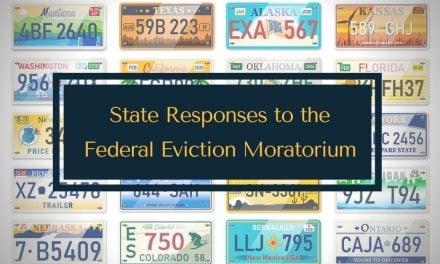Eviction can be a messy process for both landlords and tenants. Thankfully, it isn’t always a necessary conclusion. There are other options that can either accomplish the same goal as eviction or that can get rid of the need for one at all.
General Eviction Process
It is important for every landlord or property manager to have a decent understanding of the legal eviction process and its steps, even if they have never had to go through it before. The eviction process includes terminating the lease, court orders, official notices, appropriate communication, and adherence to state laws. These details are important to know so that you do not unintentionally either go through with an illegal eviction or, if you end up in court, do something to damage your eviction claim.
Keep in mind that, while it is typically legal to go through with winter evictions, it is illegal in most states to shut off utilities while the tenants are still in the unit. This is especially true in states that often get temperatures below 15 degrees.
How to Tell When to Evict
There are a variety of reasons for you to evict a tenant, whether out of necessity or desire. These reasons can include, but are not limited to:
- Habitually late rent payments or total failure to pay rent
- Lease violation
- Disrupting other tenants
- Holdover
- Using the property for illegal purposes
- Damage to the property
Depending on the offense, there are many alternatives to eviction that you can use rather than going through the eviction process. However, if eviction still turns out to be the only option, then be sure to look at your state and local laws so you can proceed with a legal eviction.
Possible Eviction Alternatives
Try Online Rent Payments
If a tenant is having issues with paying rent, then you can send them a “late rent” notice. Hopefully, this will spur them to pay their rent and the problem solves itself, but if not, online payments have proven to be very effective at eliminating late rent or no payments. Consider setting up online rent payments to ensure your renter pays on time each month.
However, if extenuating circumstances have occurred and the tenant is temporarily unable to pay the rent for the month, then you can create a payment plan for them. Only make a payment plan if you trust this tenant and if they have a good history with you. Payment plans are effective if a trusted tenant is experiencing financial hardship. You can give them an extended deadline or establish a weekly payment arrangement while they get through their current situation.
Seek Mediation
If the issue with your tenant is an argument or other form of conflict, mediation is a popular option. A mediator is brought in as an independent third party to make a decision after all involved parties have stated their cases. Having documentation of your issues will help to build your case ahead of time and to make the mediator’s job easier. The decision of the mediator is not legally binding, which leaves you and your tenant to either accept it or not. Many states also provide mediation boards to handle property management disputes like this.
Give Notice on a Month-to-Month Agreement
Depending on your local and state laws, there is always the chance that you might be able to get rid of a problematic tenant by simply not renewing their lease agreement. If you are having issues with your tenant and are unhappy with them, then they most likely have a problem with you as well and wouldn’t want to renew the lease anyway. This can be a good option for parting on, at the very least, unargumentative terms. If you have a month-to-month rental agreement, you can also give them a written 30 days (depending on your state’s notice laws) notice to vacate the property. This sounds like eviction but is slightly different because it gives your current tenants time to find a new home and time for you to find a more suitable tenant for your property and keeps you from facing an expensive eviction process.
Offer “Cash for Keys”
A simple, but effective, solution is to provide your tenant with a monetary incentive to leave on their own. The “cash for keys” method provides tenants with a chance to receive some cash if they move out by a day you both agree on. This method lets you avoid the eviction process and the fees that come with it. The most important part of this method is to do a documented move-out inspection so you can deduct your tenant’s deposit and get proof of the transaction.
These alternatives are all great to keep in mind so you can avoid the potentially long and costly eviction process. But the best way to protect your real estate income from a negative tenant situation is always going to be proactive before the tenants even sign the lease.







I have tenants the have left and owe back rent. Are you aware of a collection agency that will take these situation? Thanks, Donald
Hi Donald,
We don’t have a recommendation for a collection agency, but we do have some info on late rent in these two blogs if you would like some additional information about the process or your options. Hope this helps you!
What to do if a Tenant Skips Rent and Disappears and A Landlord’s Guide to Rent Collection | Late Payments and Past Rent Debt
My motheR has rented from this land for 15 years and he told me that I could put a RV in her yard and he wouldn’t charge me as long as I was taking care of her and my sister now he mad at me he is telling me I have to move it the only thing I have where he said I could is texting he has sent me can he make me move it
If you didn’t sign a lease nor was added to your mother’s lease agreement, then likely they can ask you to leave. I would recommend you check with your local housing authority to discuss your unique situation and options.
I have bought a tenant occupied property and as per the mortgage requirement, I have given the tenant a 60 days notice to quit in accordance with the lease agreement. But the tenant is not willing to move and wants to stay till the end of lease term. But I have signed an occupancy certificate with my lender saying that I will occupy the property in 60days after closure. What are my options?
You will need to check with your local real estate commission or housing authority but from my understanding, the lease transfers and you become their landlord. At that point, if you have given them the proper notice(s) in the proper time frame(s) and they have not vacated, you may need to proceed with an eviction. I would suggest finding out the landlord-tenant laws in your state and speak with an eviction lawyer to discuss your situation and alternatives.
If my landlord, who I have rented from for 9 years, has not given any indication that he is selling the home I have been renting. And, in fact, has sold the property. Can the new landlord offer a cash for keys? If so, and I cannot simply agree to the deal to be out in 30 days because I have actually lived in the home for 23 years and simple need more time. Can they expect me to be out in the 60 days? Or, can I ask for at least 90 days in the State of California, Tulare County, City of Porterville?
Hi Sheri, Your specific lease terms and your location will have a big impact on your rights when a landlord sells the property. To get the most accurate overview of your options, I recommend checking with a licensed attorney who is familiar with landlord-tenant law in your area. You can also check with your local housing authority for guidance. In the meantime, this article might have some extra information that could prove helpful for you: Renters’ Rights When Your Landlord Sells Your Rental Home